Sid Gauthroux
John Girault
Robert Hopkins
Judith Kramer
Billy McCord
Richard D. Porcher
Brian Scholtens
Eddie White
Ed Farnworth
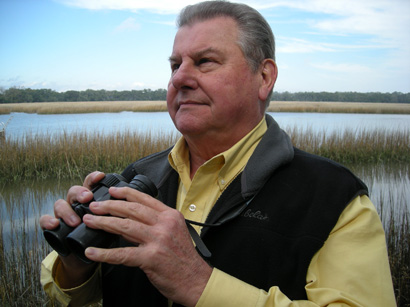
Dr. Gauthreaux received his B.S. from the University of New Orleans, his M.S. and Ph.D. from Louisiana State University, and was a Post-Doctoral Fellow at the Institute of Ecology, University of Georgia. He was a faculty member at Clemson University for 37 years and taught ornithology, animal behavior, and behavioral ecology in addition to conducting research on bird migration and habitat selection using a combination of direct visual techniques and radar. He currently is a part-time Senior Scientist in Avian Science and Remote Sensing and Technology at GeoMarine, Inc., and holds a part-time faculty appointment at the Center of Excellence in Airport Technology (CEAT) in the Department of Civil and Environmental Engineering at the University of Illinois in Urbana-Champaign where he works on the assessment of avian radars for airport applications to reduce bird/aircraft collisions. Dr. Gauthreaux is a fellow and past president of the Animal Behavior Society, a fellow of the American Association for the Advancement of Science and the American Ornithologists' Union, and a member of several ornithological societies. He has served as Chair of the South Carolina Heritage Trust Advisory Committee and President of the Carolina Bird Club.

John Girault acquired a background in natural resource management at the University of North Carolina at Wilmington. His enthusiasm for the outdoors was fueled by his work with the US Forest Service in Vermont and the National Recreation Area, Land Between the Lakes, in Tennessee & Kentucky. John moved to Charleston, SC in 1996 and worked at Kiawah Island Resort for 5 years as their Activity Director. He then worked with the Charleston Symphony Orchestra as the Marketing and Development Director until 2006. John has been the Executive Director of the Mount Pleasant Land Conservancy (MPLC) for 3 years. During his time with the MPLC John has lead the organization through the process of successfully securing it’s first conservation easement in 2009. Since then, the MPLC has been able to preserve over 200 acres of undeveloped property and now holds four conservation easements and title to a significant portion of the headwaters to Shem Creek.

Robert R Hopkins was born and raised in Mt. Pleasant. As the youngest of six children he found the space he needed outside and his love for the outdoors has grown with his education and experiences. He attended Brevard College and studied Environmental Education before returning to the College of Charleston where he graduated in 1986 with a degree and a desire to teach. For 15 years he taught at Whitesides Elementary focusing on nature-based education. Weekends and vacation days found him running an environmental education camp for young people and helping to organize curbside recycling in Charleston County. For the last eleven years he has worked with Barrier Island EcoTours and their nature-based school fieldtrips. He has served on the Board of The Sewee Association, the Founding Board of The Children's Museum, and The Mt Pleasant Land Conservancy. His son attends USC majoring in Environmental Education. They are Members Of St James Santee Church in McClellenville.
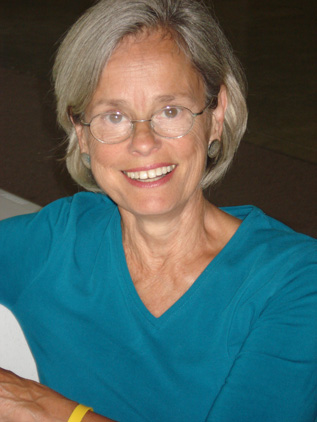
Judith Kramer is an Environmental Designer and Garden Coach, a Master Gardener, Master Naturalist and a grandparent. In 2000 Judith won a Garden Design Golden Trowel Award for her personal sanctuary garden in Summerville, SC. Judith’s concept of ‘sanctuary’ was broadened exponentially when she became a Master Naturalist in 2008 and suddenly the idea of sanctuary morphed into a place of comfort and shelter for all of us, human and otherwise.
As VP of the Coastal Master Naturalists Association and of the Lowcountry chapter of the South Carolina Native Plant Society her mission is to encourage the creation of beautiful spaces that support our amazing diversity of life, a diversity that is quickly disappearing because of unsustainable development practices and a lack of knowledge on the part of most of us in terms of how we choose to do our landscaping.
Judith believes each of us can help stem the tide of wildlife habitat loss by taking a few simple steps to make our own personal environments not only places of rest and nourishment for our own spirits, but places that support the amazing diversity of life we are privileged to share it with. . It is her hope, by bringing this message to as many people as possible her grandchildren’s grandchildren will be able to experience the thrill of discovery in nature just as she did as a child, and continues to do to this day.
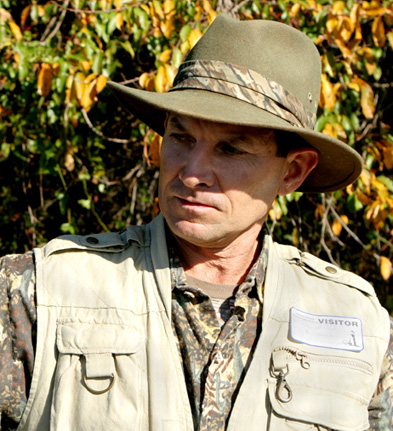
Billy McCord is a native of Manning, South Carolina. He received both undergraduate and Master of Science degrees from Clemson University. Billy’s MS degree is in wildlife biology, and his minor field of study in both undergraduate and graduate school at Clemson was entomology.
Billy was employed as a full-time wildlife biologist, ecologist and naturalist by SC Department of Natural Resources (SCDNR) and much of his professional career through dealt with the study and management of migratory fish populations His primary focus was on so-called diadromous fishes (species using both marine and fresh water during their life cycle), and including studies of Atlantic and shortnose sturgeon, American shad, American eel and river herring. He also participated in research on Atlantic coastal sharks and red drum. Billy’s later career with SCDNR focus on studies of small coastal islands within estuaries of SC where performed inventories on these 350 such islands.
Billy also has been involved with invasive species issues for years and led several projects dealing with eradication of the invasive Chinese tallow tree. He worked as part of botanical inventory teams in coastal SC as part of the Carolina Vegetation Survey. (CVS) headquartered at the University of NC. He has been an active education and has given many of lectures to schools, civic groups and other organizations. He has also led countless nature outings on similar topics and has written a number of articles for South Carolina Wildlife, a nationally acclaimed magazine published by the SCDNR.
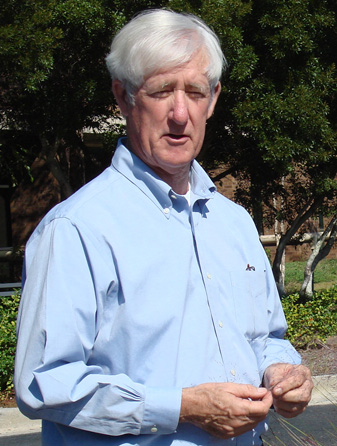
Richard Dwight Porcher, Jr., is a native of Pinopolis in Middle St. John’s Parish, Berkeley County, South Carolina. He graduated from Berkeley High School in 1957 and the College of Charleston with a B.S. in biology in 1962. He received his Ph.D. from the University of South Carolina in 1974 where he studied field botany under Dr. Wade T. Batson. Porcher began a thirty-three year tenure as a biology professor at The Citadel in 1970, where he also founded The Citadel Herbarium. In 1995 he published Wildflowers of the Carolina Lowcountry and Lower Pee Dee. He is senior author of Wildflowers of South Carolina published in October 2001. Porcher is presently Professor Emeritus at The Citadel, having retired in 2003. He currently is an Adjunct Full Professor in the Department of Biological Sciences at Clemson University where he established the Wade T. Batson Endowment in Field Botany to assist students in the study of the state’s flora and ecology. Porcher and Sarah Fick published The Story of Sea Island Cotton in 2005. Porcher presently serves as a Trustee of the South Carolina Nature Conservancy and is on the Board of Directors of the Charleston Library Society, the Waring Library, and the Carolina Gold Rice Foundation. Porcher and William Judd have a book in press on The Market Preparation of Carolina Rice and he is working on a book titled Our Lost Heritage, a history of the plantations flooded by Lake Moultrie in Berkeley County. Porcher is the 2008 recipient of the South Carolina Environmental Awareness Award.
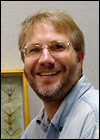
Brian Scholtens was born and raised in Iowa, where he attended Winterset High School, graduating in 1979, and Central College, receiving a B.A. in biology in 1983. He did graduate work at the University of Michigan, receiving his Ph.D. in 1990 in Ecology and Evolutionary Biology studying with Dr. Warren Herb Wagner and Dr. Brian Hazlett. He moved to Mt. Pleasant, SC in 1992 to become an assistant professor at the College of Charleston in the Biology Department, where he continues to teach Entomology and Introductory Biology and do research.
Scholtens teaches Entomology or Ecology each summer at the University of Michigan Biological Station in northern Michigan, and has also offered courses in butterflies and moths at Humboldt Field Research Institute in Maine. His research has focused on the conservation biology of threatened and endangered insects and biodiversity surveys. He co-coordinated the Lepidoptera part of the All Taxa Biodiversity Inventory in Great Smoky Mountain National Park, and has recently completed a moth survey (with Joe Culin, Clemson University, and John Snyder, Furman University) of Congaree National Park near Columbia, SC.
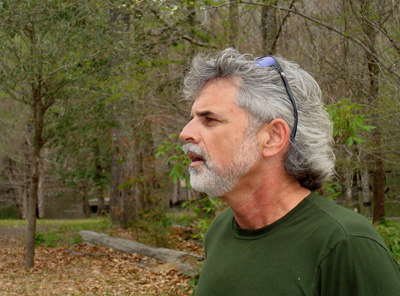
Eddie White was born on the Isle of Palms in 1960 and spent six wonderful years tramping around this barrier inland with about 50 other families. His next six years were spent in Los Angeles, CA while his father earned a PhD in microbiology. His summers were spent on a tobacco farm in Aynor SC in the heart of the Pee Dee. These early years cemented a love for nature and all things dirt/bug/farm related.
Eddie graduated from Wando HS in Mt Pleasant and earned a BS in Biology from Furman Univ. in 1982. He was awarded a DDS from the Medical University of SC in 1986. He moved to Sullivan’s Island in 1988 and owns 100 acres in the heart of the Frances Marion NF where he has a solar home in the middle of the wilderness.
Eddie White is a dentist in Mt Pleasant and has three children. He is a music enthusiast and promoter and has created a music community called Awandaw Green that hosts the year-round Barn Jam on Wednesday evenings at the Sewee Outpost. He serves on the Board of the Sewee Association, a non-profit environmental education organization.
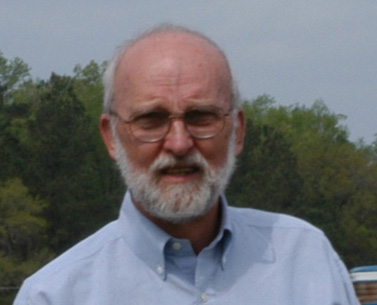
Edward G. Farnworth is an Adjunct Professor of Entomology with Clemson University at the Coastal Research and Education Center in Charleston, SC. He received his PhD from the University of Florida in entomology and ecology, a M.S. from the Univ. of Florida in entomology and zoology, and a B.S. in biology from Stony Brook University. He was a faculty member at the University of Georgia’s Institute of Ecology for ten years focusing on research in freshwater tidal marsh ecology, tropical forestry productivity and environment-development issues. A major part of his career was as Senior Ecologist and Environmental Advisor for the Inter-American Development Bank working on environment and development issues throughout Latin America and the Caribbean with overseas assignments in Peru and Jamaica. He is a co-author with Merle Shepard and Keith McCullough of “Common Insect and Spiders of the SC Lowcountry”. Ed Farnworth lives in McClellanville, SC and is a Coastal SC Master Naturalist.